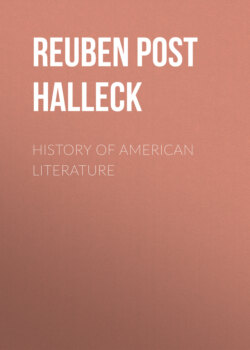Читать книгу History of American Literature - Reuben Post Halleck - Страница 33
На сайте Литреса книга снята с продажи.
EARLY AMERICAN FICTION
ОглавлениеTHE FIRST ATTEMPTS.—MRS. SARAH MORTON published in Boston in 1789 a novel entitled The Power of Sympathy. This is probably the first American novel to appear in print. The reason for such a late appearance of native fiction may be ascribed to the religious character of the early colonists and to the ascendency of the clergy, who would not have tolerated novel reading by members of their flocks. Jonathan Edwards complained that some of his congregation were reading forbidden books, and he gave from the pulpit the names of the guilty parties. These books were probably English novels. Sir Leslie Stephen thinks that Richardson's Pamela (1740) may have been one of the books under the ban. There is little doubt that a Puritan church member would have been disciplined if he had been known to be a reader of some of Fielding's works, like Joseph Andrews (1742). The Puritan clergy, even at a later period, would not sanction the reading of novels unless they were of the dry, vapid type, like the earliest Sunday school books. Jonathan Edwards wrote the story of one of his youthful experiences, but it was "the story of a spiritual experience so little involved with the earth, that one might fancy it the story of a soul that had missed being born."
Timothy Dwight (p. 92), who became president of Yale in 1795, said that there is a great gulf fixed between novels and the Bible. Even later than 1800 there was a widespread feeling that the reading of novels imperiled the salvation of the soul. To-day we know that certain novels are as dangerous to the soul as leprosy to the body, but we have become more discriminating. We have learned that the right type of fiction, read in moderation, cultivates the imagination, broadens the sympathetic powers, and opens up a new, interesting, and easily accessible land of enjoyment.
A quarter of a century before the Declaration of Independence, the great eighteenth-century English writers of fiction had given a new creation to the literature of England. Samuel Richardson (1689–1761) had published Pamela in 1740 and Clarissa Harlowe in 1748. Henry Fielding (1707–1754) had given his immortal Tom Jones to the world in 1749.
Mrs. Morton's Power of Sympathy, a novel written with a moral purpose, is a poorly constructed story of characters whom we fortunately do not meet outside of books. One of these characters, looking at some flowers embroidered by the absent object of his affections, says, "It shall yield more fragrance to my soul than all the bouquets in the universe."
